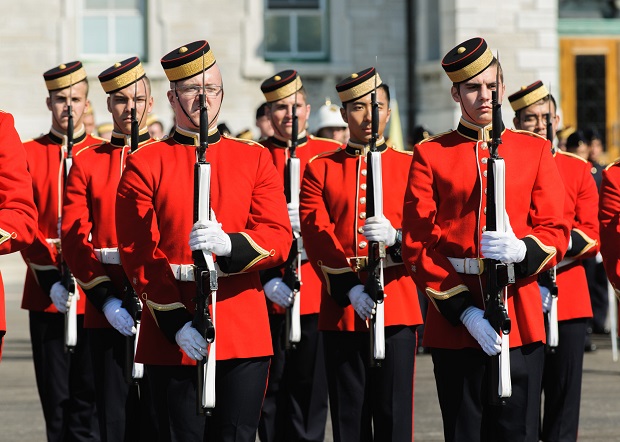The training module of the military college which grooms the future officers of the country’s armed forces faces an overhaul as part of the recommendations presented by former and current military experts.
The investigation team sent to the Royal Military College of Canada (RMCC) said they found the college’s cadets and officers enjoyed a “sense of belonging and camaraderie” but also uncovered “inconsistent leadership” which resulted in “unintended negative consequences.”
Some of the planned changes to the college which were made public on Wednesday include:
- The leadership training model within RMCC will be changed to provide a better overall experience that is focused on a positive learning environment to ensure that the higher standards required for commissioning in the Canadian Armed Forces through the RMCC program are met.
- Officer Cadets will receive more regular, focused mentoring and coaching to better prepare them for their military careers.
- Better services to Officer Cadets on campus, such as medical, dental, administrative support, and food services.
- Improvements to staff levels at the College to ensure better administrative training support to the Officer Cadets.
- Investments in infrastructure to ensure the Officer Cadets have access to modern, well-maintained facilities.
- The Canadian Defence Academy, the command responsible for the delivery of basic and higher education for the Canadian Armed Forces, will report directly to the Chief of Defence Staff.
Suspected suicides, sexual misconduct
An intensive review of the college based in Kingston, Ont. was initiated last year following concerns over suspected suicides and allegations of sexual misconduct in the campus.
Last year, it was reported that the military was investigating the sudden deaths between May and August of three RMCC cadets. The cadets were identified as Harrison Kelertas, 22, Brett Cameron, 20, and Mathew Sullivan, 19.
Related Content
CAF top brass orders review of Royal Military College of Canada
Sexual offence response team launched
There have also been several reports of sexual misconduct at the college. Court martial documents show that an officer cadet received a severe reprimand and a fine of $2,000 in May 2015 after pleading guilty to a charge of assaulting a fellow cadet without her consent in 2013.
Then Vice Admiral Mark Noman, the Canadian Armed Force’s second-highest-ranking commander, the deployment of a Special Staff Assistant Visit (SSAV) team to the RMCC was ordered to conduct a full and comprehensive assess the “climate, training, environment, culture, and program, construct” at the RMCC.
On Wednesday General Jonathan Vance, Chief of the Defence Staff, expressed satisfaction with the results of the team’s report.
“As the Chief of the Defence Staff, I am responsible for ensuring that we produce the best possible professional leaders as commissioned Officers in the Canadian Armed Forces,” a statement from the CDS said. “The report has provided me with excellent insight into the challenges faced by the College students and staff in meeting this intent, and I am taking the necessary actions to set them up for success in the future.”
The SSAV team interviewed approximately 400 people, including academic and training staff and a quarter of the student body.
“We immediately recognized that there are a lot of good things happening at RMCC,” said Vice-Admiral (Retired) Greg Maddison, SSAV Team Leader. “However, there are challenges and opportunities that need to be addressed and I am confident we provided the CDS with frank and honest insight.”
The report said that the team “encountered female and male N/OCdts who were simply outstanding individuals” but also discovered “a number of issues that need immediate and focused attention.”
“On the single occasion on which allegations of service offences were brought to the attention of the SSAV Team in the course of an interview and had yet to be communicated to the appropriate authorities, the SSAV Team brought those allegations to the attention of the RMC Chain of Command for their action,” the report said.
Negative stressors
The team found positive and negative stressors. The team identified the positive stressors as the cadets and officers “satisfaction of surmounting the obstacles presented by the intellectual challenge of earning a degree” as well as the sense of belonging and camaraderie.
The negative stressors centered on “inconsistent leadership exercised within the Training and Cadet Wings, unintended negative consequences in the implementation of defined leadership progression levels, the questionable quality and utility of the Professional Military Training programme, the coordination and time management of the Four Pillars programme, and the state of repair of some of the College infrastructure.”
The teams also assessed morale at the college as “between fair and good” but added it “had been lower following the relatively recent deaths of some N/OCdts at the College.”
The SSAV team’s report contained more than 70 recommendations.
Vance said the recommendations were “complex” and needed “immediate action.”
He directed the Chief of Military Personnel to develop an action plan for the CDS’ endorsement by the end of May 2017.
“It is my intent that significant progress on the recommendations will occur in time for the 2017/2018 academic year; however, some larger items will take longer to implement,” said Vance.

